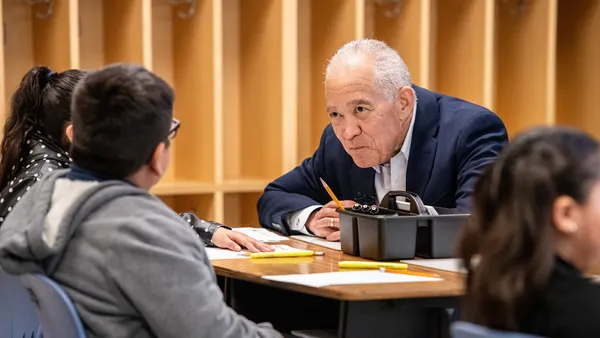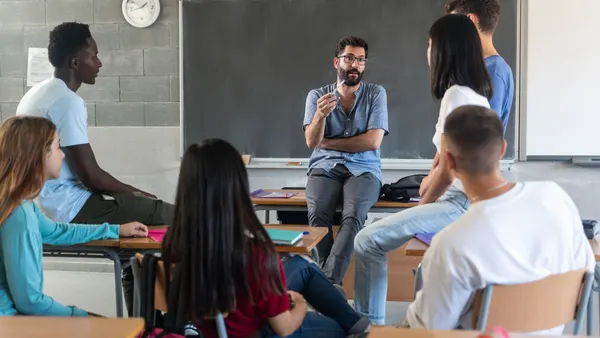Dive Brief:
- Students with disabilities are developing skills today that will transfer to the workplace tomorrow as they staff a newly opened cafe serving staff and visitors at their Charlotte, North Carolina, public school.
- The Metro School Cafe operates as a hands-on learning environment where student workers prepare and sell baked goods and coffee, serve customers and manage operations. The initiative is part of the Community Based Instruction and Community Based Training programs at Metro School, which serves about 250 students with cognitive disabilities ages 3 to 22.
- In addition to building communication and customer service skills, their work at the cafe gives the students a sense of independence and self-confidence, all of which prepare them to successfully transition to adult life, said Fermandi Dyson, principal of Metro School.
Dive Insight:
Students at Metro School, which is part of Charlotte-Mecklenburg Schools, have been participating in community-based instruction opportunities for several years, including a pop-up bakery and coffee operation, in collaboration with a community and technical education teacher.
Students wheeled the pop-up shop around the building on a cart, selling food and beverages to staff and to visitors at events like curriculum night, according to Dyson, who has led Metro School since 2016.
The full cafe opened its doors for the first time in September. “We’re excited to have an identified space,” Dyson said. “In addition to a cafe space, this is a class for middle and high school students and those in the transition space [approaching age 22]. Hopefully, they’ll be part of the crew in that space during those work times. We’re identifying their strengths and making sure we tie them to workplaces and work skills that meet their needs.”
The idea brewed as Metro School students began working in a Starbucks location a block from the school. The company is one of several partners in different industries that participate in the school's community-based instruction, Dyson said.
“We said, ‘It would be great if we could take this cart and create a cafe space. What if we had a Starbucks in our school so we could practice these skills daily and reach more students?’” she said.
As an opportunity built into students’ schedules starting in 6th grade, the cafe and similar community-based instruction opportunities touch at least 125 students per year, Dyson said. A related partnership with IKEA, in which students built out the cafe space itself, resulted from more general conversations with the furniture retailer.
“We were thinking about revitalizing a home living space for students to learn those skills,” she said. “We talked to [IKEA] about their mission and focus and what they wanted to do in our school.”
When she mentioned the cafe, “They were like, ‘Let’s do that, too.’”
That partnership led to a focus on both independent learning and vocational skills, Dyson said. “They didn’t just do the cafe, they helped us create an independent instructional space,” she said of IKEA, covering questions like, “How do you make a bed?”
Other community-based instructional opportunities at Metro School have ranged from lessons on how to make stationery to an outdoor learning space where students have been planting vegetables, fruits, herbs and spices in a greenhouse and community garden, Dyson said.
“We’re hoping to be able to sell those items at the local farmers’ market,” she said. “We’re taking what they’re doing at school and applying it to real-world situations.”
The greenhouse project has involved partnerships with construction, electric, plumbing and gardening companies, Dyson added.
Students also work off-site on a weekly basis at institutions like the local Goodwill and with a community improvement effort called Keep Charlotte Beautiful, for which students have cleaned workers’ security vests, Dyson said.
The outside organizations and businesses “were really excited, because we’ve saved them thousands of dollars by giving our students opportunities to learn those skills,” she said. “We like to make sure our students are able to give as much as we receive.”
Dyson advises leaders of other schools thinking about forging such relationships to build career education opportunities like the cafe and other initiatives to develop strong community supports.
“Knock on doors. Know who your neighbors are,” she said. “We were like a hidden gem. No one knew we were here. Introduce yourself, talk about what your mission is, and be a huge advocate for students, staff and your community. There are people who truly want to help. If you can articulate your needs, don’t be afraid to ask. One partnership brings additional partnerships.”











